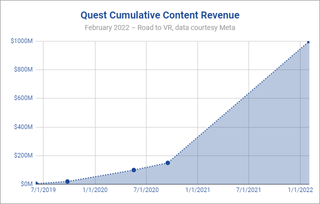Meta Quest store revenue quadrupled in the last three years
Meta Quest owners are buying tons of games and apps.

The Meta Quest store, which initially launched in 2019 and includes an assortment of games and apps for the company's line of VR headsets, has more than quadrupled in revenue over the last three years, according to a Meta earnings call. Total sales have passed $1 billion, marking a massive growth in people buying VR software since the release of the Meta Quest 2 in late 2020.
Despite this, the division of Meta (previously Oculus) that develops the VR headsets, software, and the company's upcoming AR glasses lost $10.2 billion last year. It only made $2.3 billion in revenue, which includes Quest sales and its cut of VR software purchases.
Meta loses money on every Quest 2 sold, which might be why those numbers don't look good, but the company plans to invest at least $10 billion more in the division over the next several years. Money from hardware sales isn't exactly the goal when the company would do anything to prepare you to slip you into its dead-eyed, corporate-soaked metaverse in the near future.

Currently, the top selling games on the Meta Quest store are Zenith: The Last City, Beat Saber, and the Vader Immortal pack—all the sorts of things you'd want to buy as soon as you get a new headset. And there have been a lot of new headsets circulating out there, no doubt helped by sales like the recent Black Friday one. Qualcomm, a component partner with Meta, said through "third-party market size estimates from industry analysts" that the Quest 2 shipped about 10 million units since its launch. Even if that number is fuzzy, that could be why Meta store sales are so high lately.
VR might not be as massive as loudest fans claim it to be, but it's clearly making an impact with people who want to try it out on the most accessible headset out there. And with Meta's next high-end VR and AR headset on the horizon, it could get even bigger.
PC Gamer Newsletter
Sign up to get the best content of the week, and great gaming deals, as picked by the editors.
Tyler has covered games, games culture, and hardware for over a decade before joining PC Gamer as Associate Editor. He's done in-depth reporting on communities and games as well as criticism for sites like Polygon, Wired, and Waypoint. He's interested in the weird and the fascinating when it comes to games, spending time probing for stories and talking to the people involved. Tyler loves sinking into games like Final Fantasy 14, Overwatch, and Dark Souls to see what makes them tick and pluck out the parts worth talking about. His goal is to talk about games the way they are: broken, beautiful, and bizarre.
Most Popular







